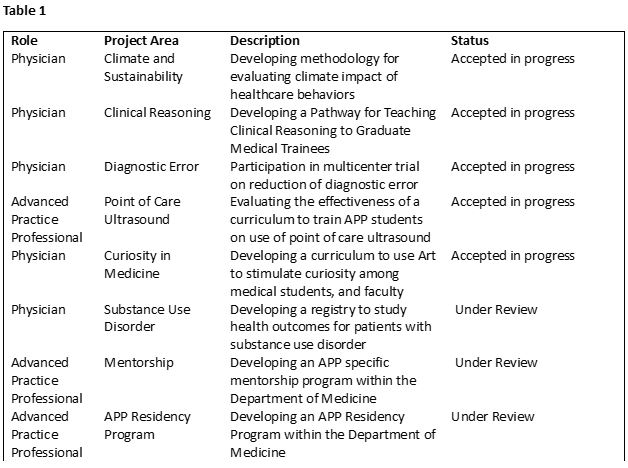Background: The growth of academic hospitalists has lagged behind the expansion of hospital medicine as a specialty, and leaders within the field have called the lack of academic hospitalists a challenge to the academic credibility of the field.1 Previous publications have cited challenges to developing academic hospitalists including lack of access to resources, an absence of research training and insufficient professional mentorship.2,3 In addition, a lack of academic protected time may contribute to burnout among academic hospitalist faculty.4 Advanced practice professionals (APPs) are a significant portion of the hospitalist work-force and are likely to face even greater challenges in developing their academic careers.
Purpose: Develop an academic pathway that provides mentorship, protected time, access to resources and faculty development for academic physicians and APPs within our Division.
Description: In January of 2023, the Department of Medicine at Maine Medical Center (MMC) established an academic pathway to support the development of academic faculty within the Division of Hospital Medicine. At the time of launching the pathway the Division included 65 physicians and 30 APPs, there were no APPs within the division with protected time to pursue academic work, and only one physician with protected time who was participating in a faculty development program from outside the Division.We invited hospital medicine physicians and APPs to apply for protected time to pursue a scholarly project, funded for three years. Proposals were developed by the applicants with support from Division leadership. Applicants also submitted an individual professional development plan to accompany their scholarly work. Applications were evaluated by Department Leadership using standard National Institute of Health (NIH) evaluation criteria to assess the quality of the proposal, alignment to institutional goals, and quality of the applicant and professional development plan. Accepted applicants were supported with up to 20% protected time. Compensation to physicians in the pathway was adjusted to reflect 80% compensation at standard clinical rates with the academic portion benchmarked to median compensation using the Association of American Medical Colleges (AAMC) benchmark based on faculty appointment. APP compensation was adjusted using a similar approach. In addition to protected time, accepted faculty are given formal mentorship, and participate in faculty development programs focusing on introduction to research methods.At the time of this submission, a total of 5 physicians and 1 APP have been accepted into the pathway with an additional 1 physician and 2 APP applications in process. There were no projects that were declined by formal committee review, but 5 out of the 6 accepted projects required significant revisions prior to acceptance. Accepted projects have ranged in scope and interest with a summary included in table 1. The pathway now serves as the model for development of academic faculty in other parts of the organization.
Conclusions: We describe successful initial implementation of an academic pathway to support the professional development of physicians and APPs. Further study of this pathway will be done through surveys of the participants as well as evaluation of their professional development during the subsequent three-year period.

